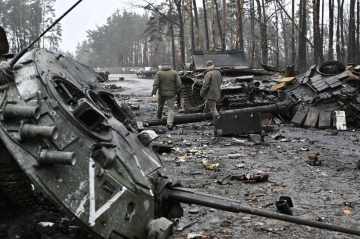Whitcomb: Very Variable Variables; Hospital Sharks; Dissolving Straws; Putin Murders His Leading Foe
Sunday, February 18, 2024
“To walk at night, when waking is the only way
You have of distancing your wretched dead,
A growing crowd, and escaping out of their
Time into yours for another little while….’’
- From ‘Insomnia,’’ by Howard Nemerov (1920-1991), American poet and teacher
GET THE LATEST BREAKING NEWS HERE -- SIGN UP FOR GOLOCAL FREE DAILY EBLAST
“They’d nail anyone who ever scratched his ass during the National Anthem.’’
- Humphrey DeForest Bogart (1899-1957) the Manhattan blueblood who became one of Hollywood’s greatest stars, referring to the old right-wing House Committee on Un-American Activities
“I don’t let my mouth say nothing my head can’t understand.’’
- Louis “Satchmo” Armstrong (1901-1971), American jazz trumpeter and singer
You Never Know
There were lots of disappointed children in parts of southern New England, especially in Greater Boston, last Tuesday when a much-ballyhooed snowstorm turned out to be mostly a dud. School officials decided, on the basis of extreme-sounding forecasts, to announce the day before that schools would be shut the next day. This gave parents who ordinarily have to work outside their homes time to figure out what to do with their young children, who would be home all day, unless the parents had access to a day-care center that remained open despite the forecast. But many parents were very irritated when the weather failed to justify the inconvenience.
The dud also depressed many in what’s left of the local news businesses, especially local TV news. The journos were looking forward to lots of dramatic video – much of it free.
Presumably, the number of snowstorms will continue to decrease as global warming continues, so such inconveniences will decline. Sometimes long-term forecasts are more accurate than short-term ones.
The coastal storm that had been predicted to unload a foot of snow headed further out to sea than advertised, and enough mild maritime air got into the act to keep much of the precipitation that did fall as rain.
Many meteorologists misinterpreted the data, of which there were lots. But don’t blame them too much. The quantity of variables that go into weather forecasting is immense. Things can be particularly dicey when it comes to storms centered in the ocean, such as Nor’easters and hurricanes, with which even a slight change in direction can make a huge difference in the impact on nearby land.
I’m not sure if many school authorities have the courage anymore to wait until shortly before dawn on days when a snowstorm is predicted before making no-school announcements. That used to be standard practice. When I was a kid, at about 6 a.m, I’d turn on my old radio, with its wooden case and fabric obscuring the speaker, to await with minor excitement my school’s storm-related announcement, interspersed with forecasts of varying accuracy by Don Kent, WBZ’s legendary MIT-trained weatherman. Considering that he had far fewer and less-sophisticated tools with which to make an educated guess about what the atmosphere would cook up than meteorologists have now – weather satellites, Doppler radar, etc. -- he usually did pretty well.
I remember a day back in the late ‘50’s when Carl DeSuze, the urbane and long-time WBZ Radio morning host, ribbed Kent for predicting a partly cloudy day on which we instead got a snowstorm. “Eight inches of partly cloudy, eh, Don!”
Of course, the school superintendents, etc., are blamed for whatever they decide! Forecast storms are inconvenient even when they go out to sea.
It might be good to remember:
“There are more things in Heaven and Earth, Horatio, / Than are dreamt of in your philosophy [science].’’
-- The title character speaking in Shakespeare’s Hamlet
Data Delirium, Continued
“Young man, I believe the market is going to fluctuate.’’
-- Reputed response by mega-banker J.P. Morgan (1837-1913) to being asked what the stock market would do.
Like the weather, economic/financial analysis must deal with a seemingly infinite number of variables, which keeps both analysts and forecasters always on thin ice (as witness the past two years’ so-far wrong forecasts of a deep recession).
When I was a business editor at three newspapers (Wall Street Journal, International Herald Tribune and Providence Journal), we used to make our own joking forecasts of how much and how often various monthly statistical reports, mostly from federal agencies and business associations, would have to be revised. The revisions were often large.
I thought of this last week when reading about the much-hyped (clickbait!) report that the Consumer Price Index rose 0.3 percent in January from December, when it rose 0.2 percent from November. From the reaction in parts of the news media and some of the markets, you’d think that this was a world-historical event.
The response was greatly overwrought.
For one thing, few news reports noted that companies often boost prices in January, especially those companies that substantially raised wages the year before. And the pandemic’s oft-surprising and confusing inflationary effects continue, though much less so than two years ago, with data-collection and analyses lagging more than in the calmer days before COVID.
Also, there’s always a long delay in accounting for housing-price movements. Much of the slowdown in housing costs – both in rents and home prices -- in the past couple of years has not been integrated into overall inflation measurements.
In any event, it’s a sure bet that the January economic figures will be revised and then revised again and again….
Meanwhile, bear in mind that inflation is affected by very, very broad international factors, such as commodities prices and central bank policies in major developed nations. The most important U.S. figure seeking to curb inflation while trying to maintain employment is the chairman of the Federal Reserve Board, currently the Trump hire Jay Powell.
xxx
The squirrels at our backyard bird feeder have gotten so fat that they can barely waddle. Late-winter Vaudeville. And I read that some folks in southern Vermont have already been tapping their maples every few days.
xxx
As The Grim Reaper, illness and family dispersals do their things, I find myself spending more time these days visiting with old friends who live alone, and sometimes have unexpectedly intense conversations with them. We often rearrange our histories in these talks.
Keep These Sharks Out of Hospitals
I don’t think that hospitals should be owned by for-profit companies, let alone by such private-equity spawns as Massachusetts-based Steward Health Care, which has played havoc with patients’ and staff needs even as senior execs make millions.
The CEO of Steward, the smooth and arrogant Ralph de la Torre, is a prime example, as a look at his two big yachts may suggest. Greed seems to trump all other drives of people like de la Torre and his associates. But you’d think that they wouldn’t flaunt their winnings as much as they do. Not great PR, especially in a sector as suffused with emotion as health care.
Given the public’s life-and-death reliance on hospitals, they should be nonprofit and well-regulated and certainly not owned by private-equity-connected characters, too many of whom are infamous for their extreme avarice, short-termism and secrecy. And taxpayers should be willing, if necessary, to subsidize enough hospital space so that we don’t have such abominations as patients in Rhode Island hospital emergency rooms having to wait an average of 214 minutes – third worst in the country, after Maryland at 242 minutes and Washington, D.C., at 329.
Ocean State waiting times have risen nearly 600 percent in the past seven years. That can be partly attributed to the closing of Memorial Hospital in Pawtucket, which served many low-income patients. And, of course, COVID has been a long-running disaster for hospitals. In any event, I think that the public would rather have hospitals that often have many empty beds than so few hospitals that people have to wait almost four hours in a surviving one’s ER. And if they’re admitted they may well have to wait many more hours for a “permanent” bed.
Straws That Go Away Fast
This might be a very hopeful sign in the fight against plastic pollution, the results of which are particularly visible in and along our waterways:
The Woods Hole Oceanographic Institution has worked with bioplastics-products producer Eastman to create a straw made from wood that degrades even faster than paper ones do. Plastic straws are one of the myriad of fossil-fuel-derived products that wreak havoc on ocean and other water ecosystems.
Let’s hope that the new material will be substituted for other plastic products, the sooner the better. But it will be a long slog. The petrochemical industry, in a campaign that recalls the tobacco industry minimizing of smoking’s health risks, keeps pushing back against those who warn about the plastic-pollution peril. And, God knows, plastic is addictively convenient.
Again, Why We Need NATO
Trump is pro-dictator, especially when it comes to Putin. As the years roll by, I am more and more convinced this is because of a mixture of money reasons – the Russians have long helped prop up the vast fraud called the Trump Organization – and because the murderous Russian tyrant has some juicy blackmail material on Trump, including assorted sexual depravities, for which the creep is well-known. And I suspect that our orange caudillo is physically afraid of Czar Vlad.
Anyway, Trump quite rationally wants to please Putin by pulling America out of the NATO alliance, and he even encourages the dictator to invade alliance members. Since Trump has no interests in anything other than personal power, money and all-around selfish gratification, and certainly no interest whatsoever in such values as democracy, human rights, the rule of law and fair and honest markets, NATO’s promotion of these values means nothing to him.
In any event, here’s another reminder that NATO is a mutual-assistance pact in which all its members pitch in to keep the peace by having a strong defense. Yes, some need to pitch in more. But no, we don’t “give away money” to our NATO partners, and our status as its leading member has always been – and would continue to be -- in our enlightened SELF-INTEREST.
NATO, a huge force multiplier for America, helps discourage aggressive dictators from launching large-scale wars and when they do, as with Putin’s invasion of Ukraine, can inflict heavy losses on them, weakening their capacity to expand their aggression. And the alliance has helped us to defend our interests around the world. Its combined power also helps deter and punish terror groups (which often act in concert with dictatorships).
The alliance spreads democratic values, which is obviously more important than ever now as fascism spreads, including in America.
NATO protects Europe’s economies, which are interwoven with, and critical to, the health of our own. This includes NATO helping to protect the trade routes essential to American prosperity.
xxx
Trump’s godfather Putin has, predictably, murdered pro-democracy hero Alexei Navalny, who died last week at a remote prison camp in the Arctic.
Meanwhile, don’t be taken in by Putin’s praise last week of Biden. It’s actually meant to help Trump. The Kremlin’s smoke machine is always on.
What He Could Maybe Do
Now that the House GOP/QAnon has blocked a measure, which had bipartisan support, to dramatically tighten border controls and, all in all, finally at least begin to clean up the immigration mess, what can Biden do through executive orders to lessen the crisis and in so doing help get himself re-elected?
Among the suggestions:
He could try to make the millions, from many countries, who seek asylum here only do so at official ports of entry and to limit those numbers. Those who cross at places between ports of entry (often in dangerous deserts and mountains) would, if they’re caught, be sent back across the border. Meanwhile, the president could sharply narrow the criteria for asylum.
And can Biden make a new security/economic deal with Mexico to stem the migrant flow?
None of this would be easy, and obviously such decisions would be very painful for millions, most of them desperate, seeking to enter the U.S., but it would far less painful for them than if Trump returns to the Oval Office. He may well do that, especially if signs of fast progress in managing the surge on our southern border haven’t become clearly evident well before the general election.
But neither Biden nor Trump can just “close down the border.’’ That’s just rhetoric. Trying to manage immigration is a fearsomely complicated task.
Whatever happens, the surge by migrants trying to get into the democratic Developed World will continue, indeed increase, driven by extreme poverty, tyranny, wars (including in Ukraine) and climate change. Just ask Europeans.
Here’s a thorough look at Biden’s immigration record:
xxx
The chatter about Biden’s age reminds me of the great {West} German Chancellor Konrad Adenauer (1876-1967), who in the latter part of his chancellorship, a chancellorship that lasted from 1949 to 1963, was called “Der Alte” -- “The Old One’’. He resigned as chancellor at the age of 87 and as head of his party, the Christian Democratic Union, at age 90.
Too old, but he held his own.
How curious that America, so often associated with the young, has so many old folks in positions of power. But then, its political system is mostly an 18th-century construct.

Robert Whitcomb is a veteran editor and writer. Among his jobs, he has served as the finance editor of the International Herald Tribune, in Paris; as a vice president and the editorial-page editor of The Providence Journal; as an editor and writer in New York for The Wall Street Journal, and as a writer for the Boston Herald Traveler (RIP). He has written newspaper and magazine essays and news stories for many years on a very wide range of topics for numerous publications, has edited several books and movie scripts and is the co-author of among other things, Cape Wind.
Related Articles
- Whitcomb: Month of Mock Horror; Zoning Revolution? A Much Bigger Looter
- Whitcomb: More $ Up the Road; Publicly Owned Utilities; Slob Society; Conscription
- Whitcomb: Global-Warming Planning; Native-American Street Signs; Israel at War
- Whitcomb: Metered Metropolis; Will They Kill a Golden Goose? Lawless Migrant Bicyclists
- Whitcomb: Absent Fathers, Absent Students; Less Video, More Historians, Please
- Whitcomb: Fall Fish; Lunching With the Prince; Autumn Assault; Classics
- Whitcomb: Soak Up the Extra Water; Death Be Proud; Honestly Facing the Migrant Crisis; Mitt Gives Up
- Whitcomb: Warm Up the Warming Issue; In Search of Supplies; Home Hell and Comfort
- Whitcomb: “Improvements’ That Turn on Us; Offshore Obfuscations; Seal of Disapproval
- Whitcomb: Instant Trouble; Buying ‘Em Out; Charging as You Drive
- Whitcomb: 75 Should Be the Max for Feds; No Pardons; Competition for Amtrak; COVID Camouflage
- Whitcomb: Downtowns as Amusement Parks; Quiet!! Office Life; Northeast Corridor Good News
- Whitcomb: Thanksgiving; Bobby’s Business; Foreign News; Beach Day; What Sort of Freedom?
- Whitcomb: ‘Poor Farmers’ Fertilizer’; Dubious ‘Stars’; Pells and Plumbers; Regressive Taxes
- Whitcomb: Toxic Status Seeking; Finally Into the Grid! Who Runs Universities?
- Whitcomb: Icy Euphoria; Stack ‘Em! Explosive Issue; German Class Divide; Our Writers
- Whitcomb: Pontoon Bridge Needed? Making a Marsh; the Choice They Wanted; Early-Onset Cancer
- Whitcomb: When the Juice Was Fresh; Discouraging Donations; Zip Lines? More Realistic Than Cynical
- Whitcomb: Drinking Into the New Year; Holiday-Card History Lessons; Revive Counties?
- Whitcomb: Time Sort of Suspended; Don’t Get Trapped; 3 Better Candidates; Plague Years
- Whitcomb: Rewilding; Staffing Crisis; Drivers’ Dues; Bonkers in Buenos Aires
- Whitcomb: Maudlin Song Season; Good Local News; Haley and Social Security
- Whitcomb: Brief Joys of Snow; Locals vs. the Chains; History Building; Putin’s Congressional Friends
- Whitcomb: Price of Delay; Old College Try; What Gazans Think; Canadian Housing; Holy Relic
- Whitcomb: Turning on the Light; Bugsy Would Have Approved; Pipes in the Ground










